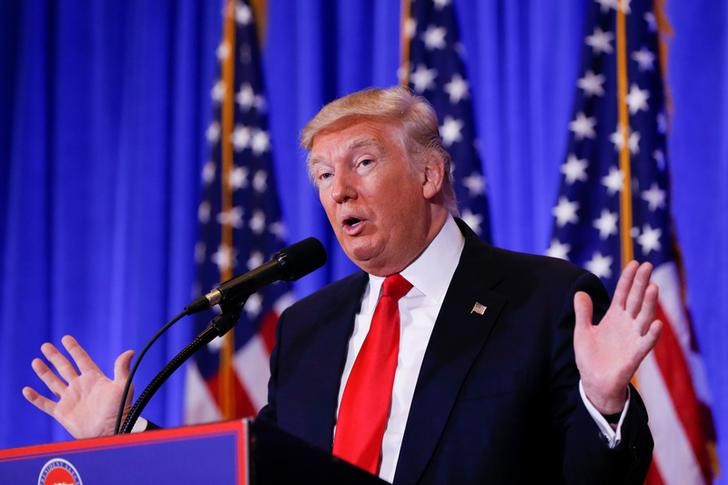By Warren Strobel and John Walcott
WASHINGTON (Reuters) - An unprecedented pre-presidential inauguration feud between Donald Trump and intelligence agencies that soon will be under his command could harm U.S. security if not quickly defused, current and former government officials said.
They said morale at the CIA and other agencies was already sagging because of disputes with Trump over whether Russian President Vladimir Putin ordered interference in the U.S. election and over leaks about an unsubstantiated dossier compiled by a private security firm suggesting Moscow had compromising information on Trump.
Unless addressed, the disputes could prompt the departure of personnel and lead those who remain to take fewer risks to counter security threats, the officials said.
In the last few months, Trump has expressed his willingness to deal with Putin and denigrated the work of the intelligence agencies. This week, the President-elect accused agencies of leaking the dossier's information to the media, but Director of National Intelligence James Clapper said he did not believe intelligence officials were responsible for the leak.
"People shooting at (the CIA) is pretty common. But usually it’s not the president," one former senior U.S. official said.
Trump's transition team did not reply to email messages seeking comment.
"I think it's a recipe for disaster," said Daniel Benjamin, who served in senior White House and State Department counter-terrorism posts under Democratic presidents. Benjamin, now at Dartmouth College, said there was a "strong chance" people would leave and they have "tremendous value" to the private sector.
Complicating the situation just a week before Republican Trump is sworn in, two of his nominees for top security posts set a different tone at their Senate confirmation hearings, heaping praise on the men and women who work in the secret world of intelligence gathering.
Republican congressman Mike Pompeo, nominee for Central Intelligence Agency director, said on Thursday that he has seen CIA personnel "walk through fire."
Separately, Trump's nominee for U.S. defense secretary, James Mattis, told senators that he had a "very, very high degree of confidence" in U.S. intelligence agencies. Mattis also put Russia at the top of a list of threats to U.S. interests.
A top official at one intelligence agency said a growing number of intelligence officers over the age of 50 and with at least 20 years of service, including at least five years overseas, have drafted and in many cases signed but not dated their resignation letters.
"There is great anxiety here about the President-elect's apparent disdain for the work we do and the dangers we face," a second senior intelligence official, at another agency, said.
He and others spoke on condition of anonymity to discuss intelligence matters and morale at their agencies.
RANCOR
The latest round of rancor began with a CNN report that Trump had been briefed Jan. 6 by intelligence and law enforcement chiefs on a two-page memo summarizing the unverified claims in the dossier. In blaming intelligence agencies for the leak, Trump wrote on Twitter: "One last shot at me. Are we living in Nazi Germany?"
Spy chief Clapper called Trump before dinnertime on Wednesday to calm the waters. Trump and Clapper differed on what was said in the phone conversation.
On Friday, Trump appeared to again blame U.S. spies for the leak.
"Probably released by 'intelligence' even knowing there is no proof and never will be," he said on Twitter.
U.S. intelligence agency personnel "are kind of shell-shocked at being accused of being Nazis and intentionally leaking this stuff," the former senior official said.
The 17 U.S. intelligence agencies have combined budgets of more than $70 billion and tens of thousands of employees. They are responsible for everything from warning of terrorist attacks to supporting American troops on the battlefield and analyzing the impacts of global trends such as climate change.
Several former U.S. officials said the tensions with Trump were the worst they could recall since President George W. Bush and the CIA traded blame in 2003 and 2004 over the failure to find weapons of mass destruction in Iraq.
But Douglas Wise, a former senior CIA official, said it will be harder for Trump to "beat up" on his own intelligence chiefs once they are in place instead of officials appointed by Democratic President Barack Obama.
"I think things are going to change," Wise said.
Still, tensions seem likely to persist after Inauguration Day on Jan. 20.
Retired Lt. Gen. Michael Flynn, who will be Trump's national security adviser, led the Pentagon's Defense Intelligence Agency until he was fired by Clapper. He has a long-time suspicion of the CIA, according to Wise and others who have worked with him.

"What Pompeo said was somewhat reassuring, but it's not at all clear whether that matters, or whether Trump’s apparent attitude and Flynn’s bitterness toward us is what counts," the second senior intelligence official said.